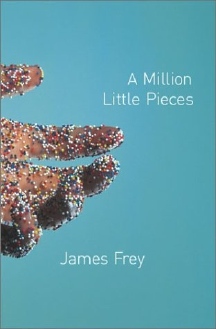 This dark and honest account of a young man’s attempt to escape the clutches of drug and alcohol addiction is an unforgettable book.
This dark and honest account of a young man’s attempt to escape the clutches of drug and alcohol addiction is an unforgettable book.James Frey is twenty-three, and has been addicted to most substances since the age of eight, with barely a few days of sobriety in fifteen years. Coming-to on a plane with no front teeth, a hole in his cheek and a staggering hangover, James’ long suffering parents check him into a famous rehabilitation centre for what is, to all intents and purposes, his last chance.
The breathless style conveys the sheer mind-boggling emergence through detoxification, with the dream-like hallucinating and internal subconscious priorities manifested. The lack of punctuation, far from making the prose a difficult read, actually gives the idea of a flurry of ideas, the repetitive, consistent desires.
‘A Million Little Pieces’ is no sob story. Frey’s genuine beliefs and initial lack of remorse keep the reader open-minded, and so the pages turn, James becomes an intriguing character that we find ourselves hoping will succeed. His rehabilitation is a rocky road, and the hierarchy within his unit is somewhat similar to a prison.
But James is an unconventional character who maintains his own beliefs, rejecting the conventional Alcoholics Anonymous and the Twelve Steps. Despite the pessimism of the staff, James’ own way ultimately proves the right path for him – his philosophy is simply to decide to stop, not replace one addiction with another (meaning religion) – which brings up an interesting theological debate as well as a discussion on the notion of addiction as a disease.
This book examines interesting issues surrounding drug and alcohol addiction, including psychiatric aspects and multi-factorial risk factors for potential addiction.
This is one of the most powerful and compelling books I’ve ever read; the very fact it is a memoir makes it unbelievably astonishing.
4 comments:
What are your thoughts on the controversy surrounding the book? (You know it's not 100% true, right?)
Let me get back to you on that one - I read it whilst on my elective from medical school (in the Solomon Islands) and knew nothing of the book beforehand - just looking for a picture today made me realise there is quite some debate!
I've found the controversy very interesting, particularly in terms of the expectations that genre raises for a reader. Read here for the 'expose'. I think that the book raises questions about what counts as 'truth'. One definition is a correspondence theory of truth in which, when writing non-fiction, everything you say should be corroboratable by documentary evidence. However, this is a rather narrow version of truth. Most of us believe you can learn something from fiction -- a kind of metanymic truth that requires no corroboration but tells us something about human nature or elucidates the power of imagination.
It is interesting that doctors that write memoirs are exempt from having to be accurate about people and places -- their duty of confidentiality means that they should not be utterly truthful. However, doctors writing memoirs do tend to include a metastatement that sets out the terms of fictionalisation to the reader.
I think Frey was naive in not putting in a metastatement, and also some of his fictionalisations (by including himself in a rail accident that he did not experience) was disrespectful to those who were involved. In later editions there is an author's note 'apologising'. My personal feeling is that the story still has merit even though parts are fictionalised. Let's face it, most memoirs conjure up details that could not possibly have been remembered in the depth with which they are related. What's your opinion, Susan?
I think you've put it very nicely there, Giskin. The book is still a great, gripping read as fiction. Of course it's dishonest to market a book as something its not (even a 'Based on a True Story' might have been better), and it's a shame this will taint the value of the book to some.
You can learn about the whole saga from this wikipedia account - http://en.wikipedia.org/wiki/A_Million_Little_Pieces
Post a Comment